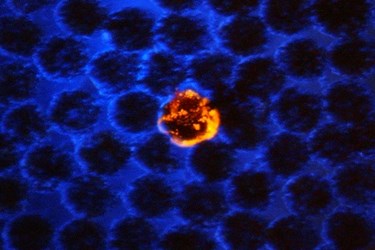Published Scientific Data Shows Plasticell's Massively Parallel Approach Is Set To Transform The Regenerative Medicine Research Landscape

New CombiCult technology massively accelerates development of stem cell cures by enabling a single scientist to carry out 10,000 stem cell biology experiments in parallel
UK stem cell biotech pioneer Plasticell Limited announced recently the publication of scientific research which demonstrates how the company’s innovative high throughput 'Combinatorial Cell Culture' (CombiCult) technology allows a single scientist to carry out 10,000 stem cell biology experiments in parallel. The scientific paper points to the potential of high throughput technologies such as “Combinatorial Cell Culture” to accelerate painfully slow biomedical research, which has hampered the development of new therapies ever since human embryonic stem cells were developed in 1998.
Plasticell’s cutting edge technology allows the discovery of improved methods to create chosen human cell types from stem cells, a critical step in the discovery of regenerative medicines to treat conditions such as diabetes, Parkinson’s disease and multiple sclerosis. The 10,000 individual experiments would have required around 200 years to complete back-to-back.
Chris Mason, Professor of Regenerative Medicine Bioprocessing at UCL, whose research group carried out external validation of the technology commented: 'Discovery of robust methods to differentiate stem cells remains a serious bottleneck for the industry. This is a major reason why only two pluripotent stem cell therapies have progressed to clinical trials despite the spending of many hundreds of millions of dollars on pluripotent stem cell translation. The unique CombiCult technology can dramatically increase research productivity, significantly cutting costs whilst accelerating the development of innovative therapies for serious medical conditions.'
Dr. Yen Choo, Plasticell’s Executive Chairman and senior author of the scientific paper, added: ‘Optimising laboratory methods to obtain affordable, industrialised cell manufacturing protocols is absolutely key to the development of cell therapies. The paper describes a study in which we used combinatorial screening to obtain a 250-fold reduction in cell bioprocessing costs, through a 50-fold increase in cell yield accompanied by a five-fold reduction in reagent costs via the use of cell culture media comprising small molecule drugs.’
The paper also demonstrates use of CombiCult technology to produce large numbers of rare adult stem cells that maintain and repair various organs of the body such as the brain and heart. 'We believe progenitor cells are key to the discovery of new drugs that regenerate specific tissues of the human body in response to injury, disease or ageing’, added David Phillips, Partner at SR One, the corporate venture arm of the pharmaceutical company GSK, which is backing Progenitor Therapeutics, a Plasticell spin-out company that uses CombiCult to develop drug-based regenerative medicines.
About Plasticell
Plasticell is a biotechnology company leading the use of high throughput technologies to develop stem cell therapies. The company’s patented Combinatorial Cell Culture (CombiCult) technology, allows it to test stem cell culture variables in combinations to discover optimal laboratory protocols for the differentiation of stem cells. Plasticell has announced CombiCult collaborations with pharmaceutical and biotechnology companies including GSK, UCB, JCR pharmaceuticals, Merck-Millipore and Sigma Aldrich. CombiCult has received a number of industry awards including the R&D 100 Award, an annual prize that recognizes the most significant technology products developed each year. For more information, visit www.plasticell.co.uk.
About Progenitor Therapeutics
Progenitor Therapeutics (formerly Progenitor Labs) is a regenerative medicine company that discovers and develops drugs to regenerate specific tissues of the human body in response to injury, disease or ageing. Regenerative drugs are an attractive alternative to the use of cells in regenerative medicine; drugs are relatively easier to develop, manufacture, package, distribute and administer, and have clearer routes to regulatory approval and reimbursement. Progenitor Therapeutics uses CombiCult combinatorial stem cell technology to produce 'synthetic' progenitor cells that resemble resident adult progenitors which naturally maintain organ function. Pharmaceutical drug screens can then be performed to discover compounds that instruct the progenitor cells to generate terminally differentiated cells, thereby restoring organ function. Whereas most currently available drugs treat the symptoms of illness, drugs that regenerate diseased organs will address the root cause of disease. Progenitor Therapeutics Limited is a spin-out of Plasticell Limited and is financed by SR One, GSK's venture capital arm. The company was included in this year's 'Red Herring Top 100', a list of the most exciting European technology ventures. For more information, visit www.progenitortherapeutics.com.
Source: Plasticell
